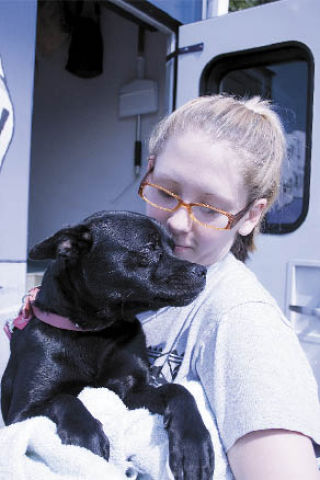Kayla Stone is allergic to cats, but that doesn’t stop her and mom Laura from rescuing strays.
A pregnant tortoise-shell-manx recently found her way into their home, producing four white kittens. Kayla held up her favorite: one with a grey marking on its head resembling “an upside-down peace sign.”
Thanks to Pasado’s Safe Haven and its mobile pet spay clinic, dubbed the Spay Station, the Stones spayed their newly acquired mama cat, named Luna, for $35. The station spayed and neutered her four kittens for free.
“I’d like to make our kitten spay special permanent,” said Spay Station coordinator Kristin Parshall. Spay and neuter surgeries typically cost about $100, an unaffordable price for many low-income pet owners.
“People don’t realize the magnitude of the pet population,” Parshall said. “It’s so satisfying to us to see people bring their pets in.”
The spay program reduces the number of unwanted animals, and also lowers pets’ risk of cancer, allowing them to live longer, happier lives.
While the spay station is one of Pasado’s proudest efforts, it is also the most expensive, operating on an annual budget of $250,000.
The station offers low-cost and free services from spay and neutering to flea control. Pets and their people often arrive before 6 a.m. to ensure their animal gets a spot in the day-long operation program as the service is first come, first served.
“Sometimes people arrive at 4 a.m.,” Parshall said. “If you provide these services for pets, people are willing to do that.”
Depending on the breeds of dogs and cats that seek surgery, the mobile-unit can accommodate up to 25 animals. On this day, animals nearly filled the mobile clinic to capacity, with only one spot to spare.
The veterinarian, tech and assistant begin to prep for surgery at 8 a.m., snipping and clipping throughout the day — usually until 2 p.m., depending on the number of animals.
By 3 p.m., the cats and dogs start to wake from the anesthesia. A half-hour later, veterinary assistant Elizabeth Vidrine emerges from the Spay Station to give post-surgery instructions to the pets’ owners.
Carol Boulton and her daughter, Megan, of Duvall, collected their groggy, 4-year-old pug, Ladybug, and her 11-month old, mixed-breed pup, Reba.
The clinic has performed about 23,000 spay/neuter surgeries since the program started in 2001. In addition to spay and neuter surgeries, the clinic also offers vaccinations, micro-chipping and flee treatments at cost.
Pasado’s upgraded its mobile facility to a newer and larger “big-rig’”clinic last year, thanks to a $150,000 anonymous donation, allowing the Spay Station to provide services to more animals at each stop.
“It’s so satisfying to us,” Parshall said about the number of people who bring their animals to get spayed and neutered.
During the past three years, Parshall volunteered with Pasado’s Safe Haven before permanently joining their staff as the Spay Station Coordinator last month.


